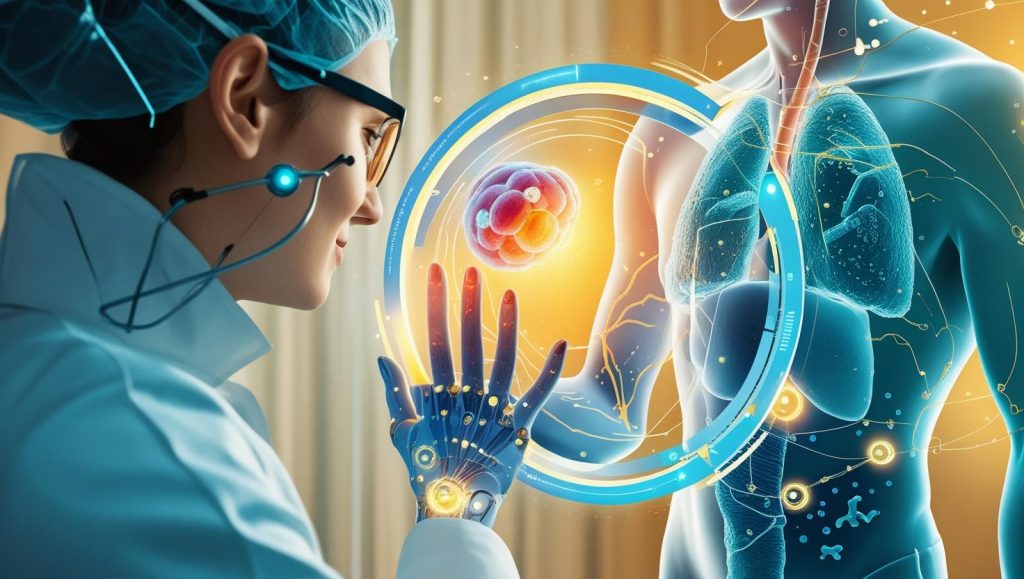By Ankit Virmani, Miami AI Club Fellow Member
The day the doctor uttered the word “cancer” felt like a punch to the gut—a moment when the world tilted on its axis for my family. Overnight, life became a whirlwind of appointments, scans, and a flood of medical jargon. Fear and uncertainty moved in like unwelcome guests. Clinging to even the smallest thread of hope became the only way to navigate the storm.
What we didn’t realize then was that a quiet revolution was already unfolding in the background. A revolution powered by something called artificial intelligence—an unlikely but powerful new ally in the fight against cancer. And it’s not happening in the pages of science fiction, but in the very heart of modern medicine, reshaping the future of cancer care in ways we are only beginning to understand.
The Silent Revolution: AI Enters the World of Oncology
Artificial intelligence (AI) and machine learning (ML) are no longer futuristic buzzwords. They’re actively transforming healthcare. What began as basic rule-based systems has evolved into sophisticated deep learning platforms. This isn’t a small upgrade—it’s a fundamental shift in how doctors make decisions.
When I first heard about AI in oncology, I was skeptical—especially while watching a loved one go through treatment. My understanding of AI was shaped by pop culture: sentient robots and opaque algorithms making decisions beyond human control. The reality, however, is far more grounded—and far more hopeful.
Cancer care generates enormous volumes of data, from genomics and proteomics to imaging and clinical trials. Much of this data is too complex and vast for humans to fully analyze. That’s where AI steps in—identifying patterns, predicting outcomes, and offering insights that may lead to more effective treatments.
A Personal Lens: How AI Supports My Family’s Cancer Journey
One of the most visible ways AI is improving cancer care is through medical imaging. Anyone who’s waited for the results of a CT or MRI knows that anxious feeling—hoping every detail was seen, nothing missed. Today, AI tools act as a second set of eyes for radiologists. Systems powered by machine learning can spot patterns, quantify tumor features invisible to the human eye, and even help predict how a tumor might behave or respond to treatment.
AI is also changing how radiation therapy is planned. By improving precision, it helps target cancer cells while sparing healthy tissue—an advancement that’s making treatments both more effective and less harmful.
Toward Precision: AI and Personalized Cancer Therapy
Cancer is not a one-size-fits-all disease. Each tumor is unique. Each patient responds differently. AI is making personalized medicine a reality—analyzing genetic and molecular profiles to help doctors select the most effective therapies and tailor drug dosages.
These tools can also flag potential side effects, predict treatment success, and help identify which patients are best matched to ongoing clinical trials. For families like mine, that’s an enormous relief in the face of complex and fast-moving medical decisions.
Clinical decision support systems (CDSS) are another powerful example. They combine patient data, clinical guidelines, and the latest research to support doctors in making evidence-based choices. These systems help assess risk, recommend treatments, and even account for other conditions and medications—adding a layer of thoughtful guidance that complements human judgment.

Fueling Research: AI Behind the Scenes
Beyond the clinic, AI is accelerating cancer research. By integrating clinical data, genetic information, and imaging, AI helps uncover new biomarkers and therapeutic targets. In drug development, AI can screen vast libraries of compounds to identify promising candidates—cutting years off the traditional process.
Hope for the Little Fighters: AI in Pediatric Oncology
Cancer in children is especially heartbreaking. Pediatric cancers are rare and biologically distinct, creating challenges that often lack robust data. AI is helping here too—making earlier, more accurate diagnoses and guiding treatment planning tailored to a child’s unique biology. It’s also being used to identify hereditary risk and support early intervention strategies.
Beyond Treatment: AI and Whole-Person Cancer Care
The combination of AI and personalized medicine is shifting cancer care toward a more holistic, patient-centered model. Treatments become more precise, side effects fewer, and quality of life better. There are economic benefits too—smarter decisions mean fewer unnecessary treatments and lower costs over time.
Emerging technologies like computer vision are further enhancing diagnostics and surgery. Real-time biopsy analysis, AI-assisted surgeries, and automated pathology are becoming part of a growing toolkit.
Navigating the Unknown: Ethical Considerations
Of course, with new power comes new responsibility. AI in healthcare raises critical ethical questions. Protecting patient privacy is essential. Algorithms must be trained on diverse datasets to prevent bias. And we need transparency—explainable AI that doctors and patients can trust. Regulatory oversight must keep pace to ensure safety and fairness.
Looking Ahead: The Future of AI in Cancer Care
AI is becoming more deeply integrated into oncology, particularly through real-time analysis of Electronic Health Records (EHRs). Explainable AI (XAI) will be key to earning trust, while technologies like quantum computing may supercharge future breakthroughs.
The vision isn’t to replace doctors—it’s to support them. AI can offer insights, track patient progress, and recommend personalized strategies, freeing clinicians to focus more on the human side of care.
Final Thoughts
The integration of AI into cancer care marks a profound shift—not just in technology, but in how we understand and treat this disease. As these systems evolve, they will play an even greater role in improving outcomes, standardizing care, and uncovering new possibilities.
For my family, AI isn’t just a buzzword—it’s a quiet ally, working in the background to help us navigate one of the most difficult journeys of our lives. And for so many others, it may hold the key to a future where cancer is no longer a devastating diagnosis—but a challenge we can overcome, together.


Leave a Reply